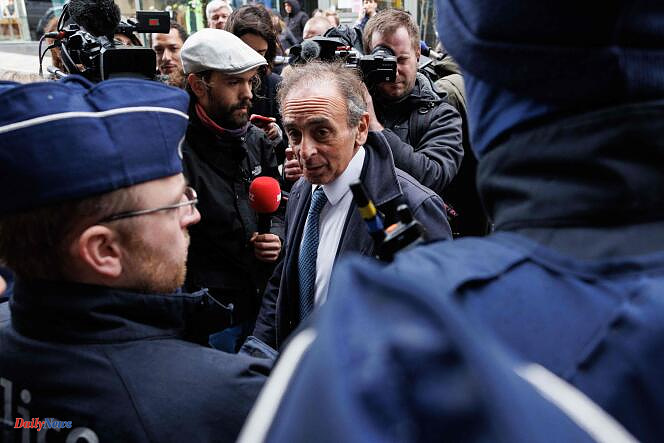The Brussels authorities on Tuesday April 16 ordered the shutdown of a controversial meeting of representatives of the nationalist right, the “National Conservatism Conference” (“NatCon”), organized a few weeks before the European elections. A decision strongly denounced inside the room where several hundred people had gathered since the morning, including nationalist and conservative Eurosceptic MEPs.
After already two deprogrammings in recent days in places supposed to host the event, the “NatCon” was banned in a third room, Tuesday at midday, in the Brussels commune of Saint-Josse. The mayor of Saint-Josse, Emir Kir, announced on Facebook that he had issued a ban “to guarantee public safety”. “The extreme right is not welcome,” added the elected official.
Several European figures from the far right and the conservative right were expected for two days, including the former candidate for the French presidential election, Eric Zemmour, the British Nigel Farage and the Hungarian Prime Minister, Viktor Orban, announced as headliner Wednesday.
Nigel Farage was, along with former British minister Suella Braverman, among the speakers on the first of the two days planned for this meeting. “We are really in the register of old-fashioned communism, basically if you don’t agree with me you must be banned,” castigated Nigel Farage, champion of Brexit.
Around 3:30 p.m., surrounded by cameras, the French polemicist Eric Zemmour appeared in front of the door of the conference room, to which the police blocked his access, before denouncing a “dictatorship”. A cordon of law enforcement agents blocked the entrance but the authorities finally gave up demanding the departure of the participants already inside, according to an AFP team.
Viktor Orban deplored an attack on freedom of expression. “The last time they wanted to silence me by sending the police was in 1988 with the Communists,” reacted the Hungarian nationalist leader on X, in allusion to the Soviet era.
Growing influence of ultra-conservatives
A demonstration called by a collective of associations called “Antifascist Coordination of Belgium” was announced for the end of the day in front of the room. “We are taking all necessary operational measures to avoid any disturbance of public order on public roads,” a local police spokesperson told AFP.
The “NatCon” was initially to be organized in a reception room in the European district located in the municipality of Brussels, but the idea was abandoned on Friday by the organizers after the reluctance expressed by Mayor Philippe Close. A second cancellation was announced on Monday by the neighboring municipality of Etterbeek, which argued that the Sofitel hotel had been misinformed about the nature of the event.
Emir Kir said he was “taken by surprise” when the meeting was finally moved to Saint-Josse, not far from the European Quarter, by the pro-Orban think tank Mathias Corvinus Collegium (MCC), co-organizer of the event .
Less than two months before the renewal of the European Parliament (by a vote in the 27 member countries scheduled between June 6 and 9), this nationalist and Eurosceptic gathering takes place against a backdrop of the growing influence of this political family in many European states .
These forces are divided, in Parliament, into two political groups; on one side, the European Conservatives and Reformists (ECR) and on the other, Identity and Democracy (ID). Although they share an anti-immigration discourse, the two groups are affected by tensions linked in particular to their positioning against Moscow in the war in Ukraine.
Some experts anticipate that one of them could, the day after June 9, take over the position of third political force in the Strasbourg Parliament behind the pro-European right (EPP) and the socialists.












